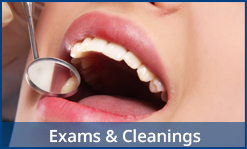If you visit your dentist regularly, there’s a good chance you’ll find out you have a cavity during examination or x-rays. Frequent, professional dental care means you probably won’t experience any symptoms common to cavities before they are caught and treated.
If, however, you don’t visit the dentist as regularly as you should for checkup, cleaning, and x-rays, cavities could worsen to the point that you begin experiencing several unfortunate symptoms. Here are a few warning signs you should be aware of so that you can seek treatment immediately.
Discomfort
As cavities grow, you could experience worsening levels of discomfort that include tenderness or tooth sensitivity, sharp pains when biting down or when drinking hot or cold liquids, or a chronic ache that gets worse over time. If cavities go undiagnosed and untreated, tooth decay will spread, not only within the infected tooth, but potentially to other teeth, the jaw, and surrounding tissues.
If you start to feel discomfort or even pain, it’s a sign that something is wrong. It might not be a cavity, but there’s always a chance tooth decay could be to blame. Regardless, you’ll want to pinpoint the source so you can take steps to alleviate discomfort, and this means contacting your dentist.
Visible Symptoms
Most of us don’t look too closely at our teeth on a day-to-day basis, even if we practice good oral hygiene and brush, floss, and rinse with mouthwash after every meal. That said, if you start to notice brown or black staining on the surface of the tooth, or worse, visible pitting (small holes in teeth), you’ll definitely want to see your dentist for a professional diagnosis.
Foul Odor or Taste
If you suffer from bad breath or a bad taste in your mouth, there could be any number of causes, including the foods and beverages you consume (garlic onions, etc.), bad habits like smoking, diseases like diabetes, dry mouth related to medications, and so on. However, if none of these common causes apply to your situation, tooth decay could be to blame.
Any time you start to notice changes to your oral health, including the onset of discomfort or bad tastes or odors in the mouth, it’s best to consult with your dentists and schedule an appointment for examination. It’s always better to err on the side of caution – catching a cavity early could help to preserve your natural teeth and stave off further oral health concerns.











